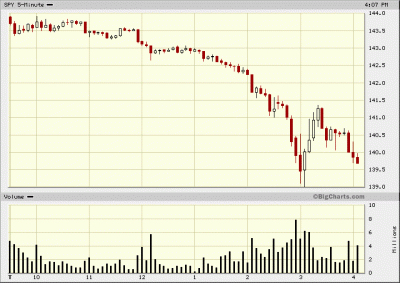On news that China’s red hot economy may need to cool down a little, sent some pretty serious waves through the world economy. At one point the selling was so fast and furious that the NYSE couldn’t keep up with the sell off, resulting in what should be another horrible day tomorrow as they catch up with the sell orders from today. This is the worst stock market plunge since 9/11.
hurtling the Dow down more than 400 points on a worldwide tide of concern that the U.S. and Chinese economies are stumbling and that share prices have become overinflated.
The steepness of the market’s drop, as well as its global breadth, signaled a possible correction after a long period of stable and steadily rising stock markets that had not been shaken by such a volatile day of trading in several years.(via)
At one point today the fall was over 500 points.
The New York Stock Exchange’s closing bell was greeted with a chorus of “boos” from the trading floor. A surge in trading volume triggered a technical glitch in late afternoon, contributing to an abrupt swing in the Dow average, which briefly fell 500 points. A Dow Jones Indexes spokeswoman said the glitch did not affect stock prices.
Investors dumped stocks with the biggest exposure to Chinese demand, including Caterpillar Inc., whose shares slid 3.6 percent, while Tuesday’s sell-off wiped out the year’s gains for all three major U.S. stock indexes.
“There seems to be just an air of nothing is safe anymore, there’s nowhere to go and people are rotating into bonds as a safe haven,” said Andre Bakhos, president of Princeton Financial Group in Princeton, New Jersey.
The Dow Jones industrial average slid 416.02 points, or 3.29 percent, to end at 12,216.24. The Standard & Poor’s 500 Index dropped 50.33 points, or 3.47 percent, to finish at 1,399.04. The Nasdaq Composite Index sank 96.65 points, or 3.86 percent, to close at 2,407.87. (via)
The question to ask now is, well so what? What does that mean for the United States? I feel that the fact that we have such a huge debt (quite a bit of which is financed by China), that continued instability in the Asian market will lead to further problems here.
Frankly I am not nearly wealthy enough, nor savvy enough, to have anything at all invested in the stock market. If anyone out there does know these things I would be interested in knowing how green stocks did. I am sure plenty of sectors survived this rather large correction, if anyone knows drop a comment.
